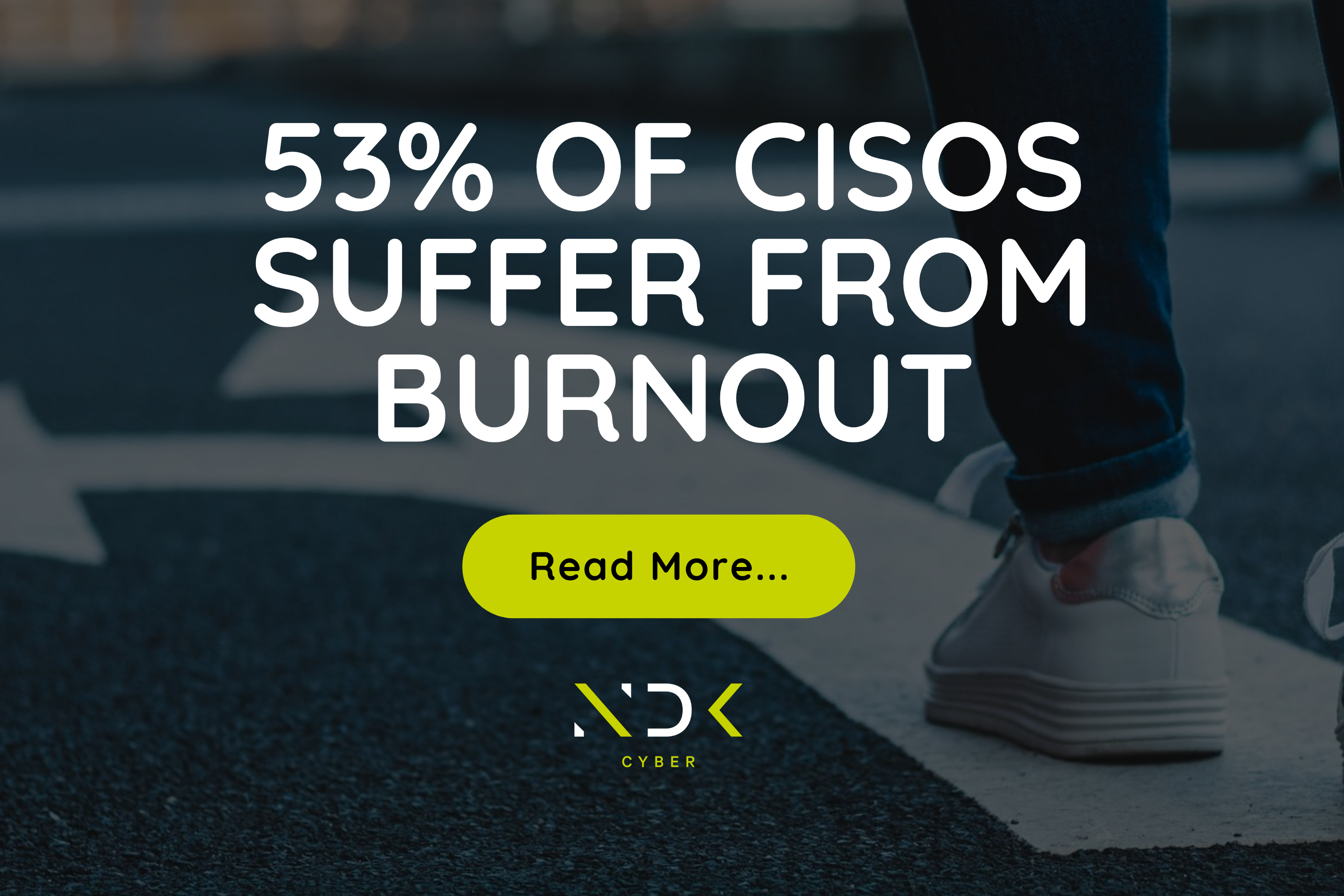53% of CISOs suffer from burnout.

Burnout isn’t just a buzzword, it is a situation in cybersecurity that’s been spinning out of control for quite a while now, and one we as recruiters talk about almost every day with our clients and candidates. But security professionals say they believe it can be turned around if they actively address the root causes of the problems.
Let's firstly talk about Chief Information Security Officers (CISOs) and their pivotal role in orchestrating defences against online threats. One of the highest ranking roles in cybersecurity, yet amidst their valiant efforts to protect lies an offline threat they may find harder to unmask…burnout.
This article ventures into the multifaceted world of cybersecurity, celebrating the excitement of the CISO role while addressing the juxtaposed challenges of burnout, shedding light on its root causes within the industry and more importantly, the solutions. It is essential to recognize that for these individuals to effectively protect your system and business, they must also be protected themselves.
The CISO role; at its heart lies the exhilarating challenge of safeguarding organizations against a myriad of digital threats, from stealthy malware to sophisticated cyber-attacks. For CISOs, and particularly the ones we have interviewed on Secure Insights, each day brings a new puzzle to solve, a new strategy to deploy, and if you have the passion, it’s prone to ignition.
We often talk about the importance of the CISO in the boardroom and as trusted advisors to executive leadership, CISOs have more influence now in shaping strategic decisions and driving digital transformation initiatives, which could potentially be the catalyst for burnout. Their ability to align cybersecurity objectives with broader business goals paves the way for innovation and growth, positioning them as indispensable partners in organizational success. But with that comes a lot more responsibility often hiding in-between the lines of the job description. Steve Zalewski, former CISO for Levi Strauss, says his team often punched above its weight because it only had so much budget and capability to fight increasingly capable hackers, and frustration built up.
Navigating Challenges with Resilience:
Often labelled ‘the thankless job’ the relentless nature of cyber threats, coupled with the pressure to safeguard sensitive data and infrastructure, alongside the stereotypical pat on the back, or lack thereof can take a toll on their wellbeing.
The widespread adoption of remote work, accelerated by the global pandemic, has introduced a new set of challenges. Balancing the demands of securing remote endpoints with the need for seamless connectivity adds further strain, blurring the boundaries between work and personal life and ultimately exacerbating burnout.
Fostering work-life harmony is essential for sustaining long-term well-being. By prioritizing downtime and personal interests, individuals can recharge and approach their responsibilities with renewed energy and enthusiasm, given it’s done with commitment and on a regular basis. Cultivating a supportive network of colleagues and mentors also provides a source of strength and encouragement, being an empathetic leader, understanding and acknowledging the signs when your colleague/employee/manager is experiencing trouble, enabling CISOs to share experiences but also feel comfortable in seeking guidance when needed.
Investing in continuous learning and development is paramount in the fast-paced world of cybersecurity. By staying up to date of emerging threats, technologies, and best practices as a business, CISOs can enhance their effectiveness as strategic leaders and innovators. Embracing a growth mindset fosters a culture of curiosity and adaptability, empowering individuals to tackle challenges head-on and with confidence, seizing opportunities for advancement.
Mental health shouldn’t be a taboo topic; investing in and implementing stress-management strategies is critical for addressing burnout in a proactive and cohesive way. Introducing initiatives such as mindfulness programs, mental health resources, and regular check-ins helps CISOs cope with stress and prioritize their well-being. By acknowledging the importance of mental health and providing resources to support it, you will simultaneously improve your workplace culture into one promotes resilience and fosters long-term success.
We don’t need to tell you that CISOs occupy a unique and exhilarating position within the cybersecurity landscape. While the journey may be fraught with challenges, the thrill of defending against digital threats and driving organizational success propels CISOs forward with unwavering determination.
RELATED BLOGS
- The Adoption of DSPM and CSPM
- Strategies to building a robust cybersecurity team - the essentials
- How to attract, and retain CISO talent.
- How is the talent shortage in cybersecurity impacting leadership?
- Women in Cybersecurity
- Online dating and recruitment, what's the difference?
- Market Update - 5 minutes with James Morris
- Protect Your Data: How to Hire the Right Security Engineer
- Top Cybersecurity Jobs in 2022
- A career in Secure Operations
- What is a Cybersecurity generalist?
- Record levels of investment for Cyber Security sector
- Transferable Skills for Cybersecurity Career




